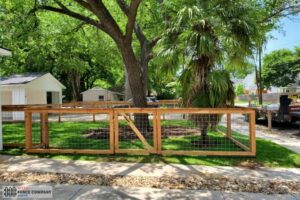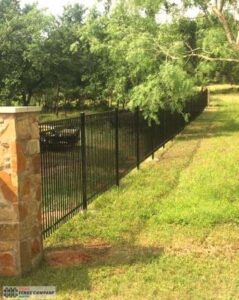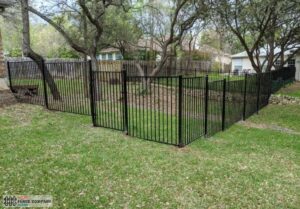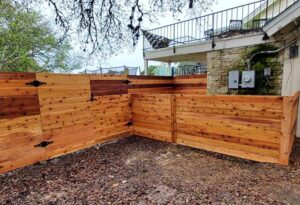Keep Gates Working During Replacement: Temporary Access Plans
TL;DR
Replacing a fence or driveway gate doesn’t have to shut down your life. With a simple access plan—temporary fencing, temporary panels, a swing-in temp gate, keypad/remote re-programming, and a clear day-by-day schedule—you can keep cars, people, pets, deliveries, and trash pickup moving safely while your new gate is built and set. In Austin, pay special attention to steep drives, limestone/expansive clay soils, and HOA/greenbelt rules. Call us at (512) 366-8108—Atlas Fence Company can stage, secure, and sign your temporary access to keep your routine normal.
Table of Contents
ToggleWhy Plan Temporary Access?

A gate controls more than a driveway—it’s your daily flow. During a fence or gate replacement, you’ll need a plan that:
- Keeps vehicles moving on your schedule
- Maintains safe egress for family and guests
- Secures pets and pool areas
- Preserves privacy and deters theft
- Minimizes friction with HOAs, neighbors, and service providers
A thoughtful plan prevents “construction lockouts,” missed trash days, stranded deliveries, or a loose dog. When handling replacement work in Austin, we prioritize design access over tools—because the best project is the one that doesn’t interrupt your life.
Related reading if you’re prepping a whole project: Fence Installation Checklist (Austin)
What “Access” Really Means (Cars, People, Pets, Services)
Vehicles
- Daily commuting: Can each driver leave by 7–8 am and return by 5–7 pm without calling a crew chief?
- Driveway slope: On steep Westlake/Cat Mountain drives, a temp swing isn’t always possible—consider rolling panels.
- Large vehicles, such as landscapers, pool trucks, or moving vans, require a certain width and a specific turning radius.
People
- Front entry vs side yard: If the driveway gate is down, will a pedestrian path remain?
- Packages/food delivery: Clear signage for drivers; a temp keypad works wonders.
Pets & Pools
- Containment: A 42–48″ temp panel is a minimum for most dogs; dig guards for “escape artists.”
- Pool safety: Maintain a self-closing, self-latching barrier at all times; add a temporary child-safe latch if needed.
Services & Utilities
- Trash & recycling: Align demolition and post-setting around Austin’s pickup day.
- Mail & parcels: Provide a drop box or temporary parcel area inside the property line.
How Austin Properties Complicate Gate Replacement

- Limestone & Caliche: Drilling for new hinge/roller posts may require core drilling or rock anchors. Post holes take longer; plan access accordingly.
- Expansive Clay: In Circle C, Avery Ranch, and parts of Round Rock/Leander, clay can heave. We use deeper piers or bell-bottom footings, which means more cure time before the gate bears weight.
- Slope & Drainage: Steep Hill Country drives affect swing arcs and bottom clearance; rolling temp gates can solve “high crown” issues at the street.
- Greenbelt & Easements: If your gate ties into side fencing along a drainage or greenbelt easement, staging space is tighter; we use narrower temp panels and anchor plates instead of ground stakes.
- HOA & Visibility: Some HOAs require continuous screening; we can add privacy mesh to temp panels to stay compliant.
7 Proven Temporary Gate Strategies
We often combine two or more for a perfect fit. Here’s how we choose, with pros/cons and best-use cases.
1) Drop-In Temporary Swing Panel
- What it is: A lightweight steel or framed cedar panel hung on temporary hinge posts set in portable base plates or shallow stakes.
- Best for: Straight drives, moderate wind, daily car flow.
- Pros: Fast to deploy, looks clean, can add privacy slats.
- Cons: Needs level landing; not ideal on steep slopes.
2) Rolling Chain-Link Temp Gate (Cantilever or Wheeled)
- What it is: A chain-link panel with wheels or a small cantilever that rolls along grade.
- Best for: Sloped or crowned driveways; wide openings (12–16+ ft).
- Pros: Works on uneven ground; easy one-hand operation.
- Cons: Less private unless we add mesh; wheels need a clear path.
3) Split-Panel Carrier (Bi-Fold)
- What it is: Two lighter panels that fold or latch together to reduce swing radius.
- Best for: Tight aprons near garages; narrow setbacks.
- Pros: Minimal footprint; quick open/close in wind.
- Cons: More latching Hardware; slightly slower for vehicles.
4) Pedestrian-Only Gate + Park-in-Street Window
- What it is: Keep a small, lockable foot gate active while the drive stays closed during work hours; schedule car access 7–8 am and 5–7 pm.
- Best for: One-car households, urban streets with legal parking.
- Pros: Lowest equipment cost; secure during the day.
- Cons: Requires disciplined timing; not great for multiple drivers.
5) Panel “Pick-and-Place” Windows
- What it is: Solid temp panels that the crew can drop in/out quickly for planned car passes (e.g., delivery windows).
- Best for: Homes with predictable schedules (trash day, known deliveries).
- Pros: Most secure while “in” and has zero moving parts overnight.
- Cons: Access is not on-demand; coordination is key.
6) Smart-Access Overlay (Temporary Keypad/Transmitter)
- What it is: A loaner keypad/receiver, magnetic lock, or simple coded padlock tied to your temp gate.
- Best for: Homes with frequent deliveries, sitters, or contractors.
- Pros: No keys to distribute; codes easy to update.
- Cons: Electronics add setup time; needs batteries/weather cover.
7) Neighbor/Back-Lane Access Agreement
- What it is: Short-term agreement to use a back fence line or shared drive; we install a temporary 36–48″ gate panel there.
- Best for: Alleys (Hyde Park), corner lots, or shared rear easements.
- Pros: Keeps the main driveway undisturbed.
- –Cons: Requires written permission and precise dates.
Day-By-Day Replacement Timeline (With Access Notes)
This is our standard sequence for driveway gate replacement in Austin. We’ll tune it to your soil, slope, and schedule.
Day 0 (Pre-Work Walkthrough)
- Finalize access windows (commute times, trash day).
- Choose temp solution(s); set keypad codes.
- Photograph existing openers, hinges, and safety sensors.
Day 1 (Demo & Temp Install)
- Remove old leaves, rollers, and opener arms.
- Set the temp swing/rolling gate or pedestrian gate.
- Post clear “OPEN/CLOSE” hours if needed.
- Vehicle access: Evening test drive through the temp gate.
Day 2 (Posts & Foundations)
- Drill/auger or core-drill into limestone; set new steel/cedar posts or gate columns.
- Pour concrete; protect with cones and caution tape.
- Access: Temp gate remains functional. Avoid driving over wet pier zones.
Day 3–4 (Cure/Shop Fabrication)
- Let footings cure; fabricate new leaf/frame offsite.
- Access: Full; pedestrians and cars are regularly allowed via the temporary gate.
Day 5 (Hang New Gate)
- Mount leaf(s), hinges/rollers; check level and clearances.
- Access: Short closures (1–2 hours) for alignment. Keep the pedestrian gate open.
Day 6 (Opener, Safety, and Limits)
- Install opener/actuator, photo eyes, edges, and program limits.
- Access: Cars pass through coordinated midday and evening routes.
Day 7 (Punchlist & Turnover)
- Install final stops, latch/lock, weather caps; set homeowner codes/remotes.
- Remove the temp gate; patch any stake holes.
- Walk through your warranty and maintenance routine.
If you’re replacing yard fencing and the driveway gate, we stage temporary fence panels to ensure pet containment never lapses—and we maintain a latching pedestrian route at all times.
Safety & Security Checklist (Austin-Specific)

- Wind & Storms: For hilltops or greenbelts, construct temporary bases using sandbags and add diagonal braces.
- Pool Code: Maintain 48″+ barrier, self-close/latched; add temporary latch sleeves where needed.
- Night Security: Use a coded lock after 7 pm; motion lights at the apron.
- Pet Gaps: Add kick plates or dig guards along temp panels for small dogs.
- Drive Slope: Choose rolling temp gates on 8%+ slopes to avoid drag.
- Markers: Cone and tape fresh footings; add reflective markers at the street edge.
- Signage: “TEMPORARY GATE—PUSH TO OPEN,” “TRASH DAY: LEAVE CANS INSIDE.”
- Data & Codes: Use a unique temporary code; change at turnover.
Communication Templates
HOA Message (copy/paste):
We’re replacing our driveway gate from [DATE] to [DATE]. A temporary gate will maintain privacy and access. Work hours are 8 am–5 pm; trash service remains inside the fence with posted instructions. No street blockage is expected.
Neighbor Note:
Hi! You’ll see a temporary gate this week while we replace our existing one. Work is daytime only. If a delivery blocks you, call/text me at [NUMBER] and we’ll clear it immediately. Thanks!
Delivery Instructions (for app “delivery notes”):
Temporary gate in use. Please open the pedestrian latch and place packages on the marked parcel pad inside the gate. Gate closes automatically; no dogs loose.
Budgeting & Cost-Control Tips
- Combine with Fence Work: Staging once (not twice) saves labor. Request to align the gate day with the fence crew’s crossings.
- Pick the Right Temp Option: A simple pedestrian gate plus two daily car windows can be cheaper than a rolling system if schedules allow.
- Reuse Hardware Smartly: Sometimes you can reuse remotes/keypads for temp access, saving a loaner kit fee.
- One-Trip Deliveries: Stack material deliveries and bulk parcels on the same day to reduce open/close cycles.
Localized Diagram (for homeowners & crews)
(imagined layout for your property; included in deliverables)
- Diagram Title: “Barton Hills Driveway—Temp Gate & Access Flow”
- Alt text (Austin-specific): “Site plan of an Austin limestone driveway showing a rolling temporary gate at the street, a self-closing pedestrian gate by the garage, cone-marked footing locations, and a sheltered parcel pad.”
Ready-Made Access Plan: What We Do for You

When you book your gate replacement with us, we:
- Map property constraints (slope, limestone/clay, greenbelt, HOA).
- Select and install the best temporary gate (swing, rolling, or hybrid).
- Set and share codes/remotes for family and service providers.
- Align the work around trash day and deliveries.
- Stage pet-safe containment and pool-safe latches.
- Maintain clear pedestrian access from 7 am–7 pm (or your hours).
- Leave you with a neat, tested, warrantied gate—and remove all temp gear.
If your current gate is failing and you’re unsure whether to repair or replace it, this guide can help with temporary fence : Fence & Gate Replacement in Austin. When considering a new swing or slide with access control, explore our Gate Installation in Austin options.
FAQs
Most Austin replacements keep vehicle access open daily via a temp gate; expect a few short windows (1–2 hours) during hanging and opener programming.
Yes. We plan to conduct a demo and footwork to ensure carts can be wheeled in/out or staged inside the temporary area with a clear path.
We prefer a rolling temp gate for steep grades, which avoids bottom drag and maintains easy opening.
Nearly always, especially if it maintains the screening standard for perimeter security , we can add privacy mesh and provide a brief method statement.
Yes—with pet-height panels, dig guards, and a self-closing pedestrian gate. We’ll coordinate outdoor times with you on loud tool hours.
We typically deploy a simple manual temp solution; powering a temp opener is possible, but it is rarely cost-effective for a short window.
Get Your Austin Access Plan (Free)
Want a same-day temporary access plan and a replacement quote that fits your schedule, slope, and HOA? Book a visit or call (512) 366-8108. We’ll map the access windows, set a temp gate, and keep your routine moving while we build the long-term solution.
Start here: Request a Fence & Gate Estimate.
